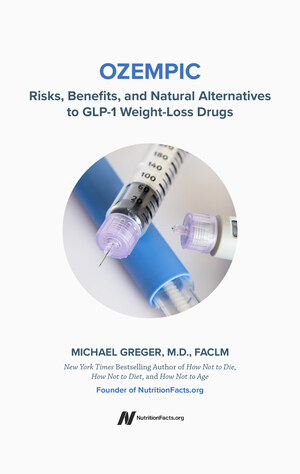Physician Michael Greger Shares Top Four Evidence-Based Rules for Potentially Adding 12 to 14 Years to Your Life
WASHINGTON, Oct. 27, 2022 /PRNewswire/ -- Each year in the United States, there are half a million heart attacks, half a million strokes, a million new cases of diabetes, and a million new cancer diagnoses. Adopting just four behaviors may have a major impact on our health.
Researchers estimate that adherence to a low-risk lifestyle could prolong life expectancy at age 50 by 14.0 years in women and 12.2 years in men. "Healthy Living Is the Best Revenge," a pivotal paper published in Europe more than a decade ago, found that adhering to just four simple lifestyle factors compared to none could potentially have a strong impact on the prevention of chronic diseases, resulting in nearly 80 percent less chronic disease risk and slashing diabetes risk by 93 percent, dropping heart attack risk by 81 percent, halving stroke risk, and cutting cancer risk by 36 percent.
The four lifestyle factors associated with a 12- to 14-year increase in life expectancy are:
- Never smoking
- Not being obese
- Averaging about a half hour of exercise a day, such as walking
- Adhering to healthy dietary principles, like consuming a lot of fruits, vegetables, and whole grains, and less meat
Michael Greger, M.D. FACLM, physician and author of The New York Times bestsellers How Not to Die and How Not to Diet, says, "The bottom line is it's never too late to turn back the clock. According to a U.S.-based study, a midlife switch just to the basics—such as eating at least five daily servings of fruits and vegetables, walking even just 20 minutes a day, maintaining a healthy weight, and not smoking—results in a substantial reduction in mortality even in the following few years. We're talking a 40 percent lower risk of dying in the subsequent four years. So, making the necessary changes to adhere to a healthy lifestyle could be considered extremely worthwhile, and middle age is certainly not too late to act."
More information regarding these studies and a library of evidence-based health information can be found free to the public at www.nutritionfacts.org.
Contact:
Mary Harris, Media Director
[email protected]
SOURCE NutritionFacts

WANT YOUR COMPANY'S NEWS FEATURED ON PRNEWSWIRE.COM?
Newsrooms &
Influencers
Digital Media
Outlets
Journalists
Opted In






Share this article